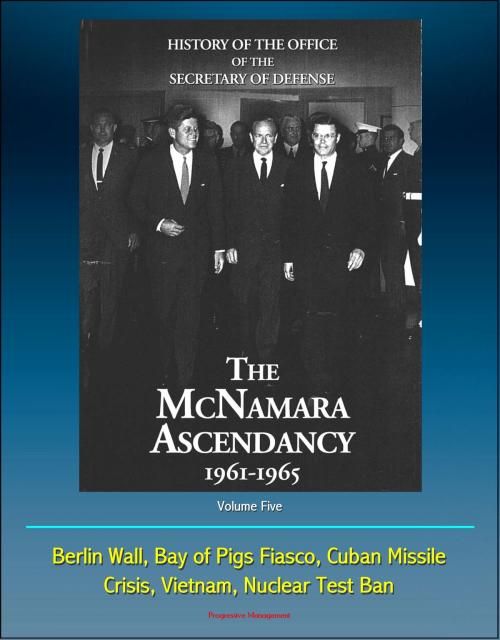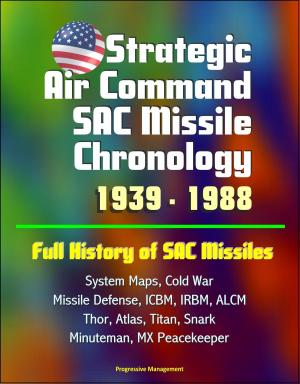History of the Office of the Secretary of Defense, Volume Five: The McNamara Ascendancy 1961-1965 - Berlin Wall, Bay of Pigs Fiasco, Cuban Missile Crisis, Vietnam, Nuclear Test Ban
Nonfiction, History, Military, United States| Author: | Progressive Management | ISBN: | 9781301295661 |
| Publisher: | Progressive Management | Publication: | July 17, 2013 |
| Imprint: | Smashwords Edition | Language: | English |
| Author: | Progressive Management |
| ISBN: | 9781301295661 |
| Publisher: | Progressive Management |
| Publication: | July 17, 2013 |
| Imprint: | Smashwords Edition |
| Language: | English |
This is the fifth volume in the history of the Office of the Secretary of Defense. It covers the first four and one-half years of Robert S. McNamara's term as secretary of defense, an exceptionally important and fateful time in the history of the United States and the Department of Defense (DoD). These were years of great international challenges for the United States and of much change in DoD. The volume begins with the efforts by President John F. Kennedy and McNamara to establish more effective management of the military establishment and ends with the full commitment of President Lyndon B. Johnson's administration to the war in Vietnam.
Robert McNamara was the longest-serving secretary of defense, the most controversial, and arguably the most successful in administering the Defense Department. The strong leadership he exerted benefited markedly from his personal relationship with and support from Presidents Kennedy and Johnson. He remained a prominent and often dominant figure through more than seven years in the two administrations.
The period from 1961 to mid-1965 witnessed strenuous efforts by McNamara to establish greater control over the DoD budget and to make the department function more efficiently and economically. He regarded the budget as central to conceiving and implementing policy and viewed it in the broader context of national security, embracing policy in its many aspects—the national economy, strategic planning, technology, force programming, collective security, military assistance, and resource allocation. McNamara had a deep understanding of the relationship between programs and budget and the need to rationalize the process that linked them. His dynamic approach and aggressive style contributed to problems with the military and Congress, both of which on occasion took exception to his innovations and practices.
Despite sometimes bitter resistance, McNamara succeeded in effecting large and important changes in the way DoD did business. He moved the department toward greater centralized direction, greater cohesion, and greater joint effort and mutual support by the military services. Progress in this direction was made possible by the exercise of personal control and coordination by the secretary, using powers strengthened by legislative and executive actions. This improved unification occurred at the expense of growing disaffection by the military.
Like the previous volumes in this series Volume V seeks to present a broad and analytical account of U.S. national security that necessarily includes in considerable detail the policymaking roles of the president, National Security Council, State Department, and Joint Chiefs of Staff. Much of the volume is devoted to OSD participation in the critical international events of the period. While the focus is properly on Washington decisionmaking, the international background of foreign policy decisions is thoroughly explored.
This is a scholarly, readable, and informative account.
This is the fifth volume in the history of the Office of the Secretary of Defense. It covers the first four and one-half years of Robert S. McNamara's term as secretary of defense, an exceptionally important and fateful time in the history of the United States and the Department of Defense (DoD). These were years of great international challenges for the United States and of much change in DoD. The volume begins with the efforts by President John F. Kennedy and McNamara to establish more effective management of the military establishment and ends with the full commitment of President Lyndon B. Johnson's administration to the war in Vietnam.
Robert McNamara was the longest-serving secretary of defense, the most controversial, and arguably the most successful in administering the Defense Department. The strong leadership he exerted benefited markedly from his personal relationship with and support from Presidents Kennedy and Johnson. He remained a prominent and often dominant figure through more than seven years in the two administrations.
The period from 1961 to mid-1965 witnessed strenuous efforts by McNamara to establish greater control over the DoD budget and to make the department function more efficiently and economically. He regarded the budget as central to conceiving and implementing policy and viewed it in the broader context of national security, embracing policy in its many aspects—the national economy, strategic planning, technology, force programming, collective security, military assistance, and resource allocation. McNamara had a deep understanding of the relationship between programs and budget and the need to rationalize the process that linked them. His dynamic approach and aggressive style contributed to problems with the military and Congress, both of which on occasion took exception to his innovations and practices.
Despite sometimes bitter resistance, McNamara succeeded in effecting large and important changes in the way DoD did business. He moved the department toward greater centralized direction, greater cohesion, and greater joint effort and mutual support by the military services. Progress in this direction was made possible by the exercise of personal control and coordination by the secretary, using powers strengthened by legislative and executive actions. This improved unification occurred at the expense of growing disaffection by the military.
Like the previous volumes in this series Volume V seeks to present a broad and analytical account of U.S. national security that necessarily includes in considerable detail the policymaking roles of the president, National Security Council, State Department, and Joint Chiefs of Staff. Much of the volume is devoted to OSD participation in the critical international events of the period. While the focus is properly on Washington decisionmaking, the international background of foreign policy decisions is thoroughly explored.
This is a scholarly, readable, and informative account.















